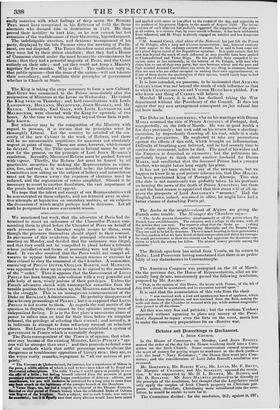We mentioned last week, that the advocates of Paris had
de- termined to resist an ordinance of the Chancellor Peatste com- manding them to plead before the Chamber of Peers on behalf of such prisoners as the Chamber might assign to them, even though the prisoners themselves should object to their counsel. In pursuance of this resolution, the principal advocates held a meeting on Monday, and decided that the ordinance was illegal, and that they could not be compelled to plead before a tribunal whose jurisdiction and forms of proceeding were not legally de- fined. It was also resolved that the Peers could not compel ad- vocates to appear before them to assign reasons or excuses for their refusal to obey the command of the Chamber. A committee, consisting of PHILIP DUPIN, °DILLON BARROT, and MAUGUIN, was appointed to draw up an opinion to be signed by the members of the " order." Thus it appears that the Government of Louts PHILIP has been brought into collision with a very powerful and able body of men, wisely jealous of their privileges. Unless the French advocates shrink with contemptible cowardice from the tenable position they have taken up, the Ministers must be worsted in the struggle. This is an inauspicious commencement of the Duke DE BROGLIE'S Administration. Ile probably disapproves of the arbitrary proceedings of PERSIL; but it is supposed that Louts PHILIP is not averse to them. As regards the real merits of the question in dispute, there cannot be two opinions among men of independent feeling. It is in the first place a monstrous abuse of power to refuse men on trial for their lives, before an irregular tribunal, the privilege of selecting their counsel; and secondly, it is ludicrous to attempt to force refractory counsel on reluctant clients. But Louts PHILIP seems to have established a system of government in France which is essentially despotic.
The Paris correspondent of the Times is of opinion, that what- ever may become of the existing Ministry, LOUIS PFIILIPS "sys- tem will be stronger than ever ; " and then proceeds to detail seine of the methods which that artful personage uses to silence the dangerous or troublesome opposition of literary men : they arc, as the writer coolly remarks, repugnant to " all our notions of pro- priety."
" The Viscount de chateaubriand, for instance, has a translation of Milton in the press, a white edition of which is said to have been taken off by Royal and Ministerial subscriptions. The noble ‘'iscou..t would spurn as proudly as ever the offer of a bribe ; but feeling himself relieved from the pressure of great pecuniary embarrassment by this happy combination of delicacy, address, and maeificeoee, his pen will doubtless be restrained for a long time to come from say fresh attack on the legitimacy of the younger branch of the Bow bona. " Victor Hugo, too, has had it tragedy in rehearsal at the Theatre Francais, foucded on that period of French history when the celebrated Duke of Orleans was Regent of the kingdom. Such a subject, and in such hands, was sure to be successful; but it is equally sure that every allusion would have been mind
and applied with more or km effect to the events of the day, and especially to the position of his present Majesty in the mouth of August ISSO. The incon- venience of such allusions hai probably suggested the suppression of the piece : at all events, it is certain that, by some occult influence, it has been withdrawn from rehearsal, and M. Hugo is already engaged on another and less dangerous subject.
" M. Armand Carrel, chief editor of the Nutionat, has just left the Prison of St. Pelagic, after a long and irksome incarceration : but, however contrary it may appear to the ordinary current of events, he is said to have come out in a great degree cured of his Republican opinions. It is quite certain that his case was beyond the reach of such influence as may possibly have been applied to Chateaubriand and Victor Hugo. He has probably been compelled to as- sociate more or less intimately, in the interior of St. Pelagie, with men who claim him as one of their own party, but men between whom and the pure and high-minded Armand Carrel there can never be any thing in common, because they are men who are either occupied in seeking their own aggrandizement, or if any of them desire the amelioration of their species, would vainly hope to find it by paths of violence and blood."
It is here intended, we presume, to be insinuated that ARMAND CARREL'S case was not beyond the reach of' such influence as that to which CHATEAUBRIAISD and VICTOR HUGO have yielded. Few who know any thing of CARREL will believe it.
Marshal MAtsoN, it is said, has declined taking the War department without the Presidency of the Council. It does not appear that any new arrangement consequent on this refusal has yet been made.


























 Previous page
Previous page